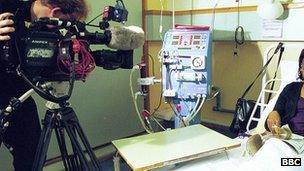Is reality TV a help or a hindrance to the NHS?
- Published

Reality shows about the NHS are often set in hospitals
Reality TV finds its way into all areas of our lives - including our hospitals. In this week's Scrubbing Up column, Dr Johnny Marshall, of the NHS Confederation, asks if the picture it reflects is distorting our idea of how the NHS works.
There has been an increasing range of reality shows focusing on NHS services in recent years: One Born Every Minute, 24 Hours in A&E, Keeping Britain Alive, and Junior Doctors, to name just a few.
These programmes provide amazing insights into the tireless work of NHS staff and the joys and heartaches of patients and their families.
They show a health service that many of us as professionals are proud to work in and are determined to improve despite the increasing pressures on it, a service that is a source of great pride.
But as more NHS reality shows appear on our screens, do they really give us a representative view of everything that the health service can and does do?
In particular, is there too much fixation on the hospital model, the wonder services and miracle drugs breaking new barriers, and not enough on the care outside hospitals that provides just as essential a purpose?
And does this bias the public's view of what we think the "right" kind of healthcare looks like, and inhibit our acceptance of change?
The NHS is a complex system, and most of us would agree that many modern treatments are unrecognisable from the original service set up in 1948.
Yet the very success of improving health outcomes for the postwar big killers is resulting in a new challenge - people living longer but developing more long-term diseases in older age.
To meet these challenges we need to move the emphasis away from hospitals and towards community services.
I fear that reality shows, as great as they are, may inadvertently reinforce the public view that hospitals, regardless of their standards, are best, without considering the alternatives.
'Not always glamorous'
The reality is that hospitals are only one part of the modern NHS story.
Many core health services may not have the TV wow factor of pioneering treatment carried out by our big teaching hospitals, or be as thrilling as the trauma care that saves lives in the most horrific of situations.
But many community-based services are life-saving - such as falls services, which have been shown to reduce death rates by as much as by 50%.
And although they are not glamorous they do save lives and, importantly, allow people to remain in their own homes for as long as possible. After all, there is no place like home.
Services such as these are a critical part of ensuring that people receive the right care.
They relieve pressure on hospitals so those who do need treatment can be seen more quickly.
And they reduce the likelihood of people having to stay in hospital because the support they need to be cared for at home or in the community is not there.
We have seen how the pressures grow on our A&E departments when these other services are not available.
Moving with the times
Like any other industry, if the NHS is to retain its core purpose and principle - to meet the needs of everyone and remain free at the point of delivery - and in a safe affordable and sustainable way, it has to move with the times. And we need to let it do so.
We have seen many improvements across a wide range of areas, with people spending less time in hospital, so it makes sense to have fewer hospital beds and more support in the community.
Similarly, by concentrating the skill and expertise needed to deliver round-the-clock specialist care for patients, we are reducing the number of places it is allocated.
By improving stroke services in London, care is now located at eight sites rather than 30 sites, with hundreds of lives - and money - saved each year.
These changes may seem daunting, and I have no doubt the NHS needs to do more to engage the public in debate.
Often we have not explained the benefits of change well enough.
Instead, we have tended to engage with communities after we have come up with a preferred solution, and so have found ourselves in long, drawn-out battles over proposals deemed to be without proper foundation or evidence.
TV 'not just entertainment'
So what, you might ask, does reality TV have to do with this?
TV shows are there to entertain us, and we should not knock the opportunity to improve our knowledge and insight of various aspects of medicine.
But TV also provides a useful mirror that reflects society - our prejudices, fears and hopes.
And if our hope is to care for everyone in the right way and in the right place, TV needs to start reflecting that.
The future I describe is already a reality in many parts of the NHS, but not evenly distributed.
So how about a reality series looking at the amazing work that goes on in the community?
After all, that is where life really happens. Is reality TV a help or hindrance to the NHS?